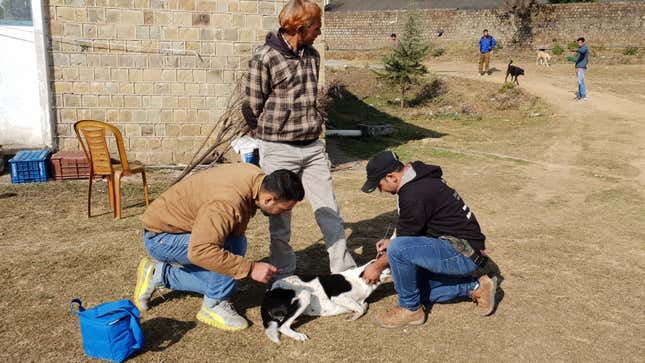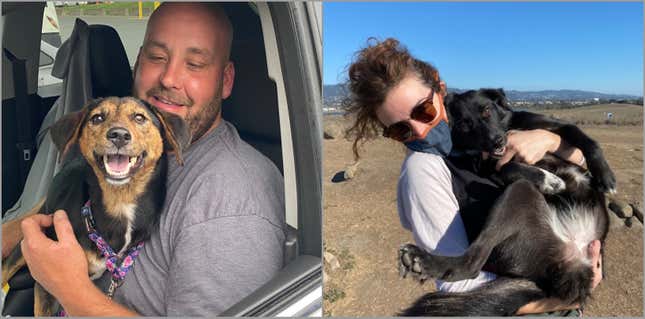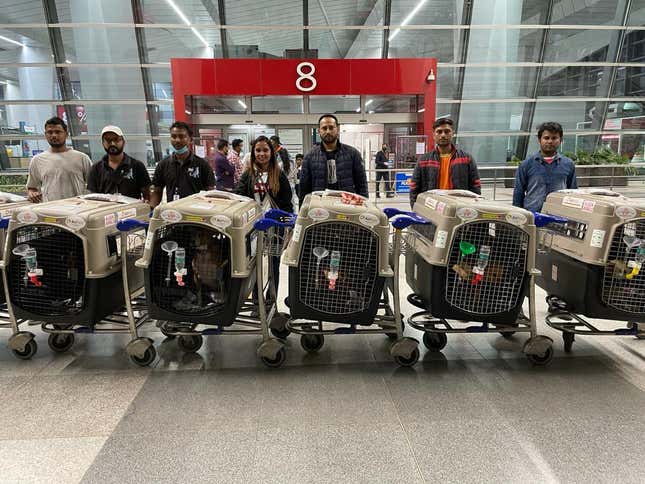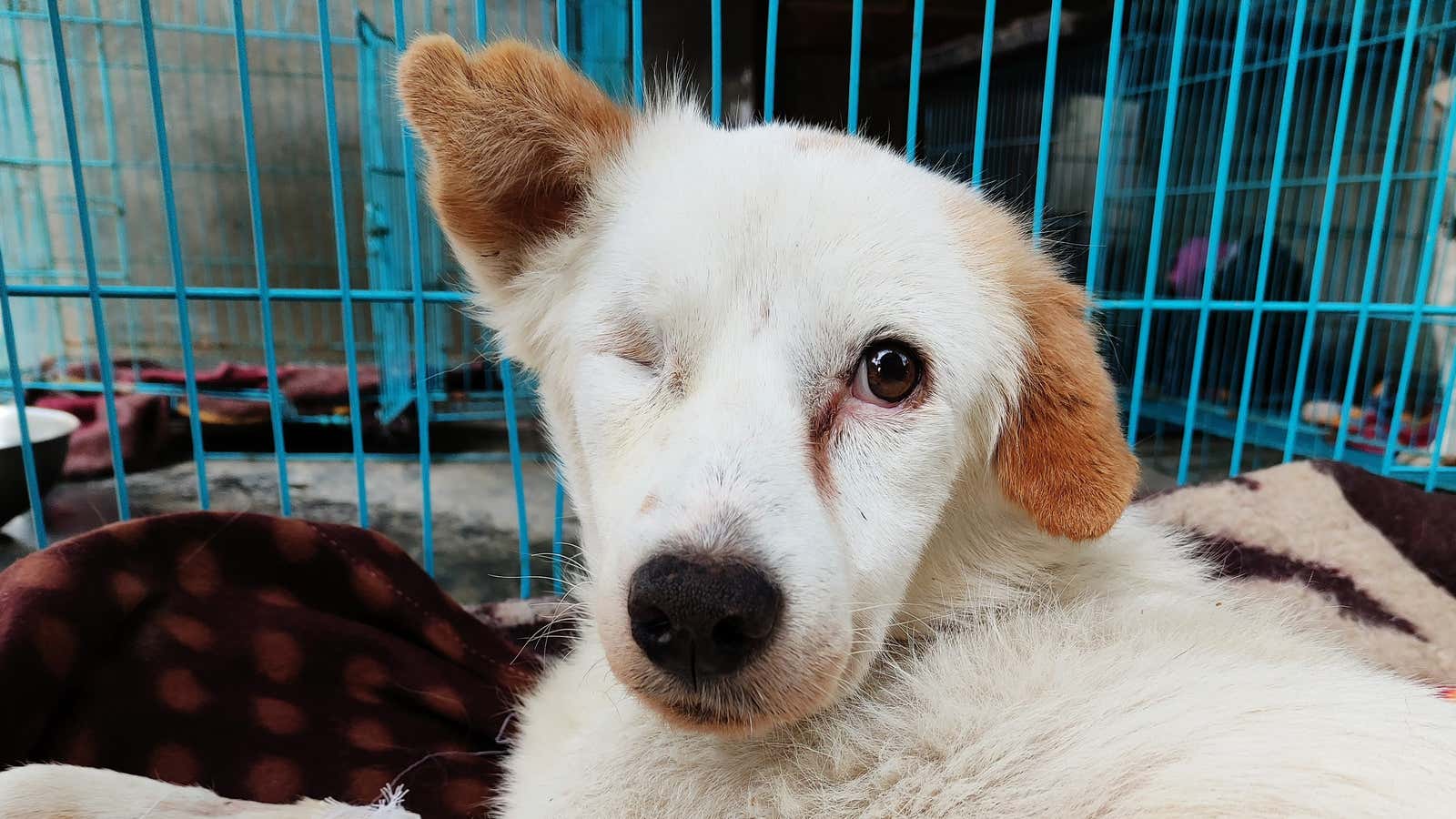In less than a month, India’s street dogs face an unprecedented crisis.
Starting July 14, the US Centers for Disease Control and Prevention (CDC) is levying a temporary suspension on imports of dogs from “high-risk” countries like India over a concern that rabies, which has been eliminated in the US since 2007, will make a comeback. “This suspension will protect the health and safety of imported dogs by preventing importations of dogs inadequately vaccinated against rabies and will protect the public’s health against the reintroduction of dog rabies,” the agency said.
The concern is valid: Rabies is fatal in both humans and animal. There is no cure for the disease once symptoms appear. And India, with the highest case count of rabies in the world, is among the biggest threats. But the CDC policy could make the rabies situation in India, where 20,000 people die of the disease each year, far worse.

“We agree, rabies is an issue and no country needs more zoonotic diseases especially during this pandemic. But this ban will not resolve the rabies situation in the 113 countries listed, says Deb Jarrett, founder and executive director at Dharamsala Animal Rescue (DAR). “Dogs and humans will continue to die, and rabies will remain on the WHO neglected zoonotic disease list.”
Once the US—the biggest destination for dogs from India—closes its doors for a year, finding rescued dogs homes and making space at shelters will become nearly impossible. It will get harder to feed, rescue, vaccinate, and neuter more strays, animal rights advocates fear.
Some adverse effects are already showing. DAR employees have already found 16 dogs with rabies in a Himachal Pradesh village in 2021 so far. In all of 2019 and 2020, there were just 21 and 14 cases respectively.
India’s streets dogs have nowhere to go…
India has a massive street dog population of an estimated 35-40 million. But more than its size, the bigger issue is that the animals are massively neglected.
Across the country, dozens of animal welfare groups are working tirelessly to feed and inoculate strays. The Bombay House—headquarters of the world’s largest IT company Tata Consultancy Services—has built a kennel for street dogs to take shelter. The Rajasthan Police even trained and employed some of them. But for every positive story, there are scores of negative ones. Housing societies harass residents who feed the dogs, and illegally remove the animals. Dogs are pelted with stones and face acid attacks.
In most cases, locals are neither educated about rabies, nor are they equipped to deal with post-bite care. While activists are trying to fight this combination of ignorance and fear with awareness drives, their weariness is still palpable.
Due to deep-seated biases about the dogs being aggressive, these animals are often not adopted locally either. Even those that are adopted are often abandoned. And if it’s an injured or disabled dog, the chances of finding a home are next to zero.
“Indian people don’t want to take normal healthy street dogs, forget ones with a leg missing or one eye missing,” Vandana Anchalia of Noida-based rescue organization Kannan Animal Welfare (KAW) told Quartz.
…and US adopters will no longer be an option
Over the years, US adopters have come to the rescue, giving dogs home. As a result, shelters and clinics in India have been able to make room to help more dogs locally.

Sending a dog abroad is an expensive affair, and it had become even more expensive during the pandemic.
Typically, people from the US would pay $2,500 to get a dog from India. In 2020, the cost went up to $3,400, said Jarrett. When tourists can fly with dogs, the cost can be reduced further but that’s been an inconsistent and unlikely option for the last year-and-a-half.
Before the pandemic, KAW was flying between 30 and 40 dogs a year from India, mostly to the US or Canada. The shelter’s last big export before the pandemic hit was in March 2020, with 10 dogs. Since then, Anchalia has only been able to fly six more dogs in April this year, whom she personally escorted to the US.

But at least it was an option. Come July 14, these activists worry they will be strapped for space and resources.
“Our shelter is overrun with dogs we cannot put back on the street and no one will adopt locally,” 53-year-old Jarrett says, who moved to India from the US in 2012 to start DAR. “With tourist visa suspended since March 2020, and now this CDC ban, international adoption is out of the equation.”
Covid-19 is hurting India’s fight against rabies
Over the last year, animals that used to depend on restaurants and other businesses for garbage have been struggling to find food, the Society for the Prevention of Cruelty towards Animals (SPCA) noted. With community dogs left increasingly hungry, dog fights over resources have risen.
Even volunteer work suffered. During the first lockdown in March 2020, two of DAR’s vets were stranded outside of the country. Then, during the second lockdown this year, three of DAR’s employees and their family members contracted Covid-19. Two of them, the director and head vet assistant, were both bed-ridden with nebulizers for three weeks.
Moreover, aid organizations and volunteers from the US and elsewhere have not been able to work on the ground to contain the disease in India.
“If the US is banning dogs due to rabies, Covid is keeping NGOs based in the US and other countries from coming in to help with mass vaccination and mass sterilization,” rues Jarrett, who is herself currently in the US. “[The street dog] population will continue to rise, rabies will increase, as will cruelty.”
All the intervention from abroad is especially important because the Indian government pays little heed to calls for help. DAR’s requests for space and funds have fallen on deaf ears for 13 years of its existence. The rescue group, which fundraises via social media, crowdfunding sites, newsletters, and grants, works out of a rented property with no concessions from the local authorities.
The national government has also made little attempt to stabilize the stray population, nor has it made eradicating rabies part of its agenda, Jarrett claims.
Activists who do things the right away—the ones who vaccinate and neuter animals, and don’t falsify documents and skirt rules, which is a common problem—are all for increased compliance, but they urge the US to reevaluate the blanket ban. “It’s like punishing everyone for some stupid people,” says Anchalia.
